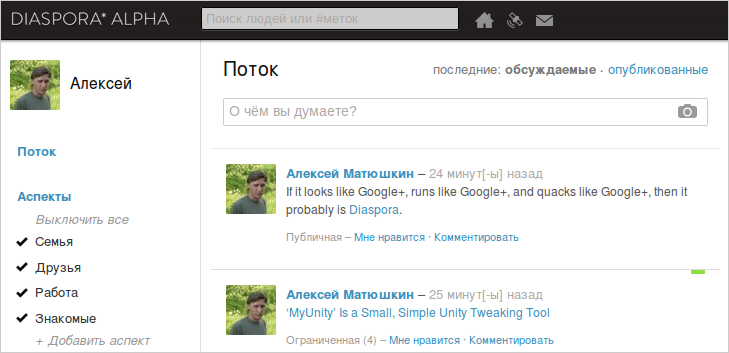If it looks like Google+, runs like Google+, and quacks like Google+, then it probably is Diaspora
The word "Diaspora" is of Greek origin. I find this definition from the bibliological dictionary most relevant to the meaning that the creators put:
According to Wikipedia, the idea of creating the project came up with a group of students from the Kurantian Institute of Mathematical Sciences (an independent division of New York University): Dan Grippi, Maxwell Salzberg, Raphael Sofaer, Ilya Zhitomirskiy, - after a speech on February 5, 2010 by Columbia University professor Eben Moglen “Freedom in the Cloud ”, in which Moglen described centralized social networks as“ spying on freedom. ”
I reprinted the main milestones of creating a “distributed social network” not by accident: I have been following the project from the very beginning, but today I got my hands on registration on one of the “nodes” - distributed servers managed by Diaspora. I registered (at https://diasp.org ) and got a little fucked up. Does this interface resemble nothing?

The diaspora supports a subset of the standard markdown . To become a “participant” - just register on one of the “open sites”. All traffic - by
Attempts to build distributed P2P systems to solve "familiar" problems seem to me worthy of attention. The pioneer (apart from the torrents) was, as far as I can tell, the decentralized search engine YaCy - now the social network living on user machines has entered the α-stage. I did not find any clear indications on the Internet why this Google+ interface exactly copies the Diaspora’s decisions (the latter also contains tweets familiar to us
I do not pretend to be original, it just seemed to me that this might be of interest to someone.
Diaspora (Greek διασπορά - scattering), the stay of a part of the people outside their country of origin. Applied to the Holy. Scripture term refers to the Old Testament. communities scattered in the tongue. lands (Jer 25:34; 2 McK 1:27; John 7:35; James 1: 1).
According to Wikipedia, the idea of creating the project came up with a group of students from the Kurantian Institute of Mathematical Sciences (an independent division of New York University): Dan Grippi, Maxwell Salzberg, Raphael Sofaer, Ilya Zhitomirskiy, - after a speech on February 5, 2010 by Columbia University professor Eben Moglen “Freedom in the Cloud ”, in which Moglen described centralized social networks as“ spying on freedom. ”
I reprinted the main milestones of creating a “distributed social network” not by accident: I have been following the project from the very beginning, but today I got my hands on registration on one of the “nodes” - distributed servers managed by Diaspora. I registered (at https://diasp.org ) and got a little fucked up. Does this interface resemble nothing?

The diaspora supports a subset of the standard markdown . To become a “participant” - just register on one of the “open sites”. All traffic - by
https. Attempts to build distributed P2P systems to solve "familiar" problems seem to me worthy of attention. The pioneer (apart from the torrents) was, as far as I can tell, the decentralized search engine YaCy - now the social network living on user machines has entered the α-stage. I did not find any clear indications on the Internet why this Google+ interface exactly copies the Diaspora’s decisions (the latter also contains tweets familiar to us
#хэштегиand @упоминания).I do not pretend to be original, it just seemed to me that this might be of interest to someone.
